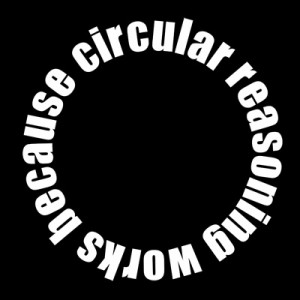“Bankers have a limited amount of money, and must choose who to invest it in. Each choice is a gamble: taken together, they must ultimately yield a net profit, or the banker will go out of business. This set of incentives yield a common complaint about the banking system: that bankers will only lend money to individuals who don’t need it. The harsh irony of the banker’s paradox is this: just when individuals need the money most desperately, they are also the poorest credit risk and, therefore, the least likely to be selected to receive a loan” – Tooby & Cosmides (1996, p. 131)
While perhaps more of a set of unfortunately circumstances than an actual paradox (in true Alanis Morrissette fashion), the banker’s paradox can be a useful metaphor for understanding social interactions. Specifically, it can help guide predictions as to how we would expect the victim/perpetrator/third party dynamic to play itself out, and, more importantly, help explain why we would have such expectations. The time and energy we can invest in others socially – in terms of building and maintaining friendships – is a lot like money; we cannot spend it in two places at once. Given that we have a limited budget with which to build and maintain relationships, it’s of vital importance for some cognitive system to assess the probability of social returns from its investment; likewise, individuals have a vested interest in manipulating that assessment in others in order to further their goals.
And, for the record, reading my site will yield a large social return on your investment. Promise.
The first matter to touch on is why a third party would feel compelled to get involved in other people’s disputes. One reason might be the potential for the third party to gain accurate information about the likely behavior of others. If person A claims that person B is a liar, and it’s true, person C could potentially benefit from knowing that. Of course, if it’s not true, then person C would likely have been better off ignoring that information. Further, if the behavior of person B towards person A lacks predictive value of how person B will behave towards person C, then the usefulness of such information is again compromised. For instance, while an older sibling might physically dominate a younger sibling, it does not mean that older sibling will in turn dominate his other classmates or his friends. Given the twin possibilities of either receiving inaccurate information or accurate but useless information, it remains questionable as to how much third party involvement this hypothesis could explain.
Beyond information value, however, third parties may also get involved in others’ conflicts in the service of forming and maintaining valuable social alliances. Here, the accuracy of the information is less of an issue. Even if it’s true that person B is an unsavory character, he may also be a useful person to have as an ally (or at least, not have as enemy; as the now famous quote goes, more or less: “He might be a son of a bitch, but he’s our son of a bitch”). As I touched on previously the accuracy of our perceptions are only relevant to the extent that accuracy leads to useful outcomes; accuracy for its own sake is not something that could be selected for. This suggests that we shouldn’t expect our evaluations of victimhood claims to be objective or consistent; we should expect them to be useful and strategic. Our moral templates shouldn’t be automatically completed in all cases, as our visual templates are for the Kanizsa Triangle; in fact, we should expect inputs to often be erased from our moral templates – something of an automatic removal.
Let’s now return to the banker’s paradox. In the moral realm, our investments come with higher stakes than they do in the friendship realm. To side with one party in a moral judgment is not to simply invest your time in one person over another; it involves actively harming other potential investment partners, potentially alienating them directly and their allies indirectly (and harming them can bring with it associated retribution). That said, aligning yourself with someone making a moral claim can bring huge benefits, in the form of reciprocal social support and building alliances. As Tooby and Cosmides put it:
…[I]f you are unusually or uniquely valuable to someone else – for whatever reason – then that person has an uncommonly strong interest in your survival during times of difficulty. The interest they have in your survival makes them, therefore, highly valuable to you. (p.140)
So the question remains: In the context of claims to victimhood, how does someone make themselves appear valuable to others, in order to recruit their support?
Please say the answer involves trips to the red light district…
There are two distinct ways of doing this which come to mind: making yourself look like a better investment, and/or make others appear to be a worse investment. Victims face a tricky dilemma in regard to the first item: they need to make themselves appear to genuinely have been a victim while not making themselves look too easily victimizable. To make oneself look to victimizable is to make oneself look like a bad investment; one that will frequently need support and be relatively inept at returning the assistance. Going too far in other direction though, by making oneself out to be relatively unharmable, could have a negative effect on your ability to recruit support as well. This is because, as in the banker’s paradox, rich people don’t really need money, and, accordingly, people in strong positions socially are not generally viewed as needing help either; you rarely find people concerned with the plight of the rich and powerful. Those who don’t need help may not be the most grateful for it, nor the most likely to reciprocate it. Tooby and Cosmides (1996) recognized this issue, writing:
“…[I]f a person’s trouble is temporary or they can easily be returned to a position of full benefit-dispersing competence by feasible amounts of assistance…then personal troubles should not make someone a less attractive object of assistance. Indeed, a person who is in this kind of trouble might be a more attractive object of investment than one who is currently safe, because the same delivered investment will be valued more by the person in dire need.” (p.132)
Such a line of reasoning would imply we should expect to find victims trying to manipulate (a) the perceptions others have of their need, (b) their eventual usefulness, and (c) the perceptions others have concerning the needs and usefulness of the perpetrator. Likewise, perpetrators should be engaging counter manipulation along precisely the same dimensions. We would also expect that victims and perpetrators might try and sway the cost/benefit analysis in third parties via the use of warnings and threats – implicit or explicit – about the consequences of siding with one party or another. Remember, third parties are not making these judgments in a vacuum; if the majority of third parties side with person A, third parties that sided with person B might now find themselves on the receiving end of social sanctions or ostracism.
DeScioli & Kurzban (2012), realizing this issue, posit that human mind contains adaptions for coordinating which side to take in a dispute with other third parties, so as to avoid the costs of potential despotism on the one hand, and the costs of inter-alliance fighting on the other. If a publicly observable signal not tied to one’s individual identity is used for coordinating third party involvement – i.e. all third parties will align together against an actor for doing X (killing, lying, saying the wrong thing, etc), no matter who does it – third parties can solve the problem of discoordination with one another. However, one notable problem with this approach is the informational hurdle I mentioned previously: most people are not witnesses to the vast majority of acts people engage in. Now, if person A suggests that person B has done something morally wrong, and person B denies it, provided the two are the only witnesses to the act, there’s not a whole lot to go on in terms of publicly observable signals. Without such signals (and even with them), the mind needs to use whatever available information it has to make such a judgment, and that information largely revolves around the identity of the actors in question.
I’d like to return briefly to a finding I’ve discussed before: men and women agree that women tend to be more discriminated against than men, even in the face of contradictory evidence. This finding might arise because people are perceiving – accurately – that women tend to be objectively more victimized. It might also arise because certain classes of people – in this case, women, relative to men – are viewed as being better investments of limited social capital. For instance, in terms of future rewards, it might be a good idea for a man to align himself with a woman – or, at the very least, not align himself against her – even in the event she’s guilty; moral condemnation does not tend to get the romance following, from my limited understanding of human interaction.
It would follow, then, that the automatic completion vs automatic deletion threshold for our moral templates should vary, contingent on the actor in question: friends and family have a different threshold than strangers; possible romantic interests have a different threshold than those we find romantically repulsive. Alliances might even serve as potential tipping points for third parties. Let’s say person A and B get involved in a dispute; even if person A is clearly in the wrong, if person A already has a large number of partial backers, the playing field is no longer level for third party involvement. Third party involvement can be driven by a large number of factors, and we shouldn’t expect all moral claims to be viewed equally, even in cases where the underlying logic is the same. The goal is usefulness; not consistency.
References: DeScioli, P., & Kurzban, R. (2012). A Solution to the Mysteries of Morality Psychological Bulletin DOI: 10.1037/a0029065
Tooby, J. & Cosmides, L. (1996). Friendship and the banker’s paradox:Other pathways to the evolution of adaptations for altruism. Proceedings of the British Academy, 88, 119-143




























